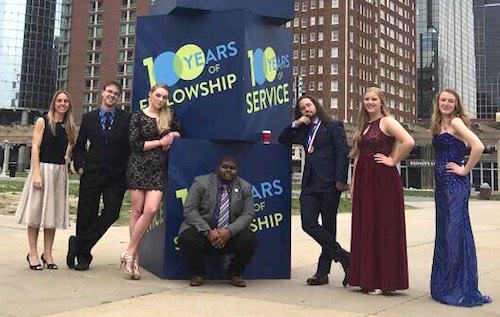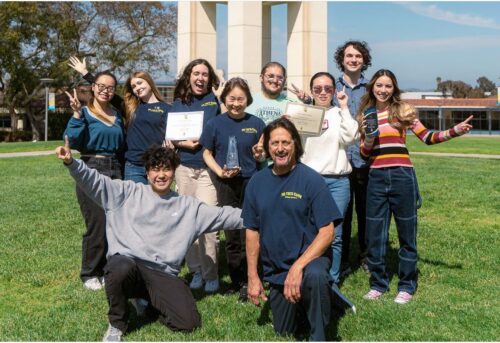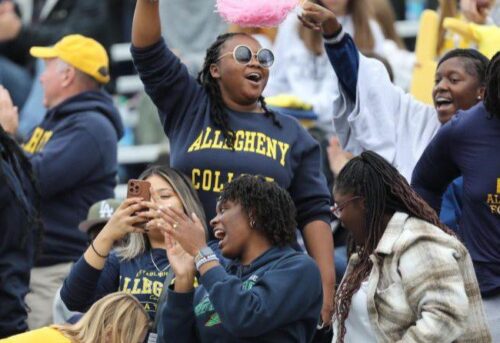Brandon Green can think of three times when he almost lost his life to gun violence.
Growing up across the South Side of Chicago, moving from “one bad place to another,” he would sometimes find himself in the wrong place at the wrong time. But as he got older, he began to understand that his life didn’t have to be this way. Education would become his way out.
“In high school, I decided that I no longer wanted that lifestyle to be my ‘normal,’ ” he said.
Today, 22-year-old Brandon attends Heartland Community College in Illinois. He’s the public relations officer of the Alpha Omega Xi Chapter and is majoring in computer science.
When Brandon was young, his cousin was killed by gun violence. He couldn’t process what happened; he only felt afraid, and his fear increased as he grew older.
“There was an atmosphere around my neighborhoods that you could die any day at any second,” he said. “I would walk around filled with anxiety. After I saw person after person get shot or come close to death, eventually the anxiety became normal, and losing people around me became an expectation.”
Brandon enjoyed learning, but school wasn’t a priority in his neighborhood. Succeeding at school would get you bullied or teased; going to college was considered “lame.”
As a result, he hid his love for school. He never saw college as an option because he didn’t have any real-life examples that showed him it was possible.
“The ‘hood’ teaches you to join its tribe very young,” he said.
Things changed in high school. Brandon attended Wendell Phillips Academy High School, where, for the first time, he saw that people who looked like him and came from a similar situation could succeed. He found faculty and staff that believed in his abilities.
Brandon joined the Junior Reserve Officer Training Corps (JROTC), which taught him leadership and service skills and kickstarted a desire to become more involved in school. He grew as a leader, learning patience, understanding, and teamwork.
 After-school activities and a love of reading helped Brandon avoid the violence in his neighborhood. Friends and family gave him spaces where he could be himself, which helped him stay centered. He surrounded himself with people who were removed from the violence, and he began thinking beyond his surroundings.
After-school activities and a love of reading helped Brandon avoid the violence in his neighborhood. Friends and family gave him spaces where he could be himself, which helped him stay centered. He surrounded himself with people who were removed from the violence, and he began thinking beyond his surroundings.
Brandon was accepted to Illinois State University, which he attended for a semester before dropping out to care for his first child. A year later, he decided he was ready to get back to school, and he enrolled at Heartland Community College, where he earned a scholarship to pay for tuition and books.
Joining Phi Theta Kappa was a way for him to give back to Heartland. He had seen the Alpha Omega Xi Chapter’s work and commitment to improving the school and community and wanted to be part of it.
Through PTK, Brandon learned to manage his time more efficiently. He found balance, and he found the same level of support he had found in high school. Attending the 2018 annual convention in Kansas City, Missouri, was a particularly life-changing moment for him.
“The fact that thousands of people came together to celebrate education filled me with joy,” he said. “It gave me a moment to reflect about where I came from and where I am now.”
Brandon said Phi Theta Kappa gave him the confidence and willpower to co-found the college’s first Black Student Union with fellow student Seyveon Martin and to hold officer positions in other organizations. Now with a 3-year-old son and 5-month-old daughter, he believes he has become a better leader, friend, and father.
Looking back, Brandon could see how the violence of his childhood and youth had shaped him. He recalled a time at Illinois State University when he heard fireworks going off in the distance.
“I jumped out of bed and laid on the flood because I thought they were gunshots, but my roommates continued to sleep soundly,” he said. “That was the first moment I realized the damage that was done.”
Done, but not irreparable. Heartland gave him a second chance, and Phi Theta Kappa gave him a support system.
“Heartland felt like home, but Phi Theta Kappa felt like family,” he said.




